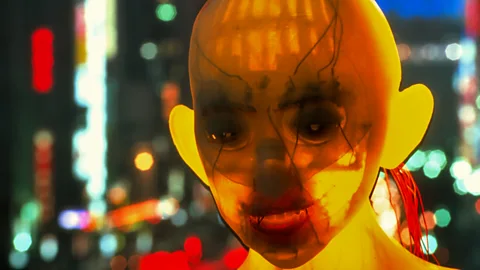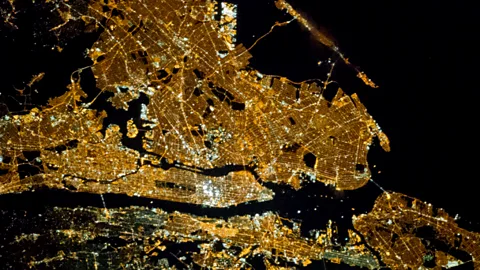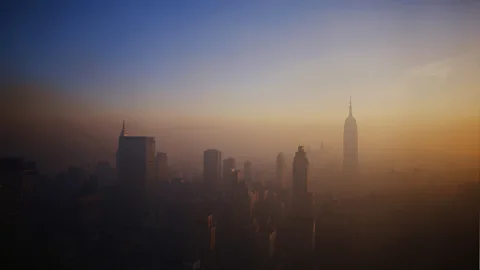New York 2050: Connected, but alone

New York has always been a city that has looked towards the future, a city at the forefront of urban living. But what if a changing world forces the Big Apple’s citizens to retreat from its smoggy, polluted streets? In this exclusive piece of fiction, writer Tara Isabella Burton imagines a city whose residents turn to avatars to lead fractured, virtual lives.
There are so many of us now.
Two centuries ago, the urban bourgeoisie of Haussmann's Paris used the grands boulevards, the shopping arcades, as the stage on which to perform the identities they had chosen for themselves. We are no longer so limited.
People like us don't use streets. We can, we must, use space for houses. The broad sidewalks of Madison Avenue, the soft green of Central Park: all these, if we see them at all, are only shadows between skyscrapers: patches between the towers that have taken the place of crosswalks, of trees.
After all, we don't need them. Social media – now a quaintly antiquarian term, like “speakeasy” or “rave” – has been supplanted by an even bolder form of avatar-making. People like us needn't leave the house, after all. We send our proxy-selves by video or by holograph to do our bidding for us. Selves we can design, control. The Danish philosopher Soren Kierkegaard once analysed the anxiety of choice, of the dizziness engendered by an infinite number of possibilities. “Because it is possible to create,” he wrote, “creating one’s self, willing to be one’s self … one has anxiety. One would have no anxiety if there were no possibility whatever.” We know this is false. Of course we can create ourselves. We can look, act, enchant others, any way we like. We make ourselves in our own images.
At least, people like us do.
People like us have no limits. With so many avatars, we have no fear of missing out. We can be everywhere, every time. We simultaneously attend cocktail parties, dinners, fashionable literary readings, while going on five or ten dates with five or ten different men, who may or may not be on dates with as many women. All it takes is a click, and we've grown adept at multi-tasking. We sit within our white walls, in our windowless rooms, and project onto the barest of surfaces the most dizzying imagined backgrounds: Fifth Avenue as it once was, the Rainbow Room still intact, Coney Island before it sank into the sea. We project our friends and lovers, as they want us to see them, and know that somewhere, on their ceilings, we exist: the way we've always wanted to be.
Smog-covered streets
The technology was invented in Silicon Valley, but it was in New York that it first caught on. In New York, where we were most wild for self-invention, where we were most afraid of missing out, where we were so afraid of being only one, lost in a crowd.
We fill up our hard drives with as many avatars, as many images, as we can afford. Demand has driven up the price of computer memory, and now this is where the majority of our money goes. The richest can afford as many selves as they like – any and all genders, appearances, orientations; our celebrities attend as many as a hundred parties at once. Though most of us still have to choose. We might have five or six avatars, if we're comfortably middle-class.

Still, we worry we've chosen wrong.
We never go outside. Not without gas masks and maybe not even then. As for leisure – housing prices have reached such stratospheric levels that most physical restaurants, bars, cafes, have closed. In any case, nobody leaves the house if they don't have to.
Public transportation is so crowded we must wait for five or six trains to get on – if we are able to get on at all without brawling our way onboard – sharing space with those we politely call outsiders – labourers, cleaners, mechanics stewing in sweat – who do not have the near-universal luxury of staying at home. We have forgotten what other human beings smell like, and so the stench of flesh – flesh pressed up against flesh makes us sick. The touch of skin is like slime.
The strangest part is how ugly we find them. We've grown so used to creating ourselves in our own images, designing the hair and shape and skin of the holograms we send forth to virtual meetings, choosing our gender (so many of us present as men), that the sight of a real human being – with no control over her body – makes us uncomfortable, like talking to a leper must once have been. Even the people we like, the people we know, we've probably never seen. We live in spaces so small we couldn't welcome friends if we wanted to.
‘Nostalgists and fantasists’
When we are forced to encounter one another – when we accidentally make eye contact with the silent deliverers of our factory-food in the halogen halls of our teetering skyscrapers – we are as awkward and apologetic as if we've walked in on someone naked.
It reminds us of all the things we cannot change. It reminds us of the demands of our bodies. It reminds us we need to eat.
You can't eat, after all, at a virtual restaurant. It's impolite to mention this. We pretend that somewhere, at one of the five or seven or 100 social engagements we are honouring simultaneously, there's one in which we're devouring food from the old days – fish, fowl, fresh meat. We pretend that we're eating something real.
The problem with our food isn't that it's bland. They're good at creating artificial smells, artificial tastes. The manufactured chicken we eat tastes more like chicken than chicken does. Somehow, that's worse.
People sometimes try to grow vegetables on their rooftops during seasons when the smog isn't too bad. We pretend to feel sorry for them – nostalgists and fantasists, we call them, when we laugh about them with those blue-skinned, purple-haired friends that flicker on our walls – yet when a carrot withers into something not too far from fruition, we are sliding memory sticks underneath their doors. Even the brownish carrot-tops command a high price. We just like to hold them, to press them to our nostrils, to remember.
And, of course, no people like us have any children.

Where would we put them? Our creative impulses are better utilised elsewhere: pixels convey so much more than seed. We have so many selves that we do not fear not leaving one – a half-self, at that – behind.
But the young are different.
You'd think, in a way, that they'd be the compliant ones. After all, they've grown up in this. They can only imagine how it was before. Perhaps that's why they're so stubborn. They don't know how bad alternatives can be.
Bracing for the end
They long for a past that did not exist. They take jobs as labourers, cleaners, deliverers, by choice. They gather up earthly detritus – technology outmoded and obsolete, spanning decades and schools of thought, gramophones, microphones, laptop computers, gas lamps – and find places in which to store them. They walk in the shadows of the skyscrapers so high you cannot see the sun. They walk along the East River and skip memory sticks in the mud. They watch them sink – so slowly – beneath the chemical skin of the water.
They meet in person and do nothing but sit in silence and breathe and hold hands. They close their eyes and touch one another's faces. They feed one another, hands to one another's mouths. They refuse to create avatars. They fetishise flesh.
They're proud of it – that they are only ever in one place at once.
They welcome the demands of the body. They celebrate hunger, thirst. There are rumours about them – that they take part in orgies, that they intentionally mortify their flesh because the sight of blood, at least, is real – but they do not need to be true to disturb us.
We try not to think about them.
When the chemical mud of the East River rises up, when the tidal waves come, when the air becomes too thick to breathe – sometimes, when we look at video footage of what it's like outside, we think it can't be long – they'll be no more capable of surviving than we are. They'll choke and drown and starve just like we know we will.
But of the five or seven or 100 iterations of us, electric and intangible, we're convinced, at least one of us will survive. That's what keeps us going. The hope there might be one.
